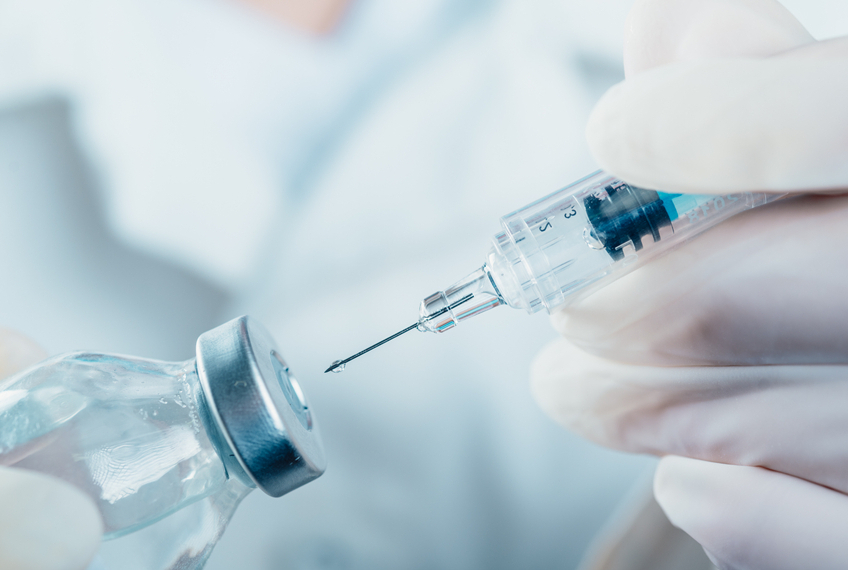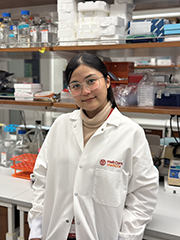
Prior exposure to coronaviruses that cause ordinary colds can boost the immune system’s ability to attack a vulnerable site on the COVID-19-causing coronavirus SARS-CoV-2, according to a study led by investigators at Weill Cornell Medicine. The finding suggests a new vaccination strategy that might provide broader and more durable protection against SARS-CoV-2 strains compared with existing vaccines—and might also protect against other emergent coronaviral threats.
In the study, published Oct. 9 in the Journal of Experimental Medicine, the researchers analyzed human antibody responses to the base of SARS-CoV-2’s outer spike protein. This segment, known as the S2 subunit, mediates the coronavirus’s entry into a host cell, and, because of this critical function, does not vary much between different coronavirus subfamilies. Thus, targeting it successfully could help provide broad protection against existing and future coronavirus threats. Although exposure to SARS-CoV-2 alone elicits a weak antibody response against S2, the researchers found evidence that prior exposure to common cold coronaviruses, especially one called OC43, can prime the immune system for a much more effective anti-S2 response—one that may be able to neutralize a wide range of coronaviruses.

Dr. Patrick Wilson
“This is a proof of principle that targeting S2 can be protective, and that priming the immune system with exposure to a common-cold coronavirus can be the key to that protection,” said senior author Dr. Patrick Wilson, the Anne E. Dyson Professor of Pediatric Research, professor of microbiology and immunology in pediatrics and a member of the Gale and Ira Drukier Institute for Children’s Health at Weill Cornell Medicine.
Viruses typically conceal their most critical and unchanging sites from the immune system, so that natural antibody responses to these sites are weak. Researchers have been exploring vaccine strategies for overcoming these critical-site defenses to provide broader protection compared to traditional vaccines.
Dr. Wilson and his team observed, in a 2021 study, that antibodies from patients with severe COVID-19 cross-reacted strongly against spike proteins from common-cold coronaviruses—suggesting that the patients’ responses to SARS-CoV-2 relied heavily on pre-existing immunity to viruses that currently cause less severe illness. They set up the new study to explore whether this pre-existing immunity could be a source of antibodies that provide broad protection against coronaviruses by targeting S2.
They confirmed that the S2-targeting antibody response in the severely ill patients came predominantly from B cells that were already in place due to past exposure to common cold coronaviruses, especially OC43. Some of the anti-S2 antibodies from these B cells could neutralize not only SARS-CoV-2 and OC43 but also several other coronaviruses, including bat-infecting coronaviruses. In contrast, patients who had less severe COVID and recovered made anti-S2 antibodies that generally did not neutralize SARS-CoV-2.

Dr. Siriruk Changrob
Why did a more broadly neutralizing anti-S2 response emerge in the patients with more severe illness? The researchers found evidence that in these patients, the normal development of the antibody response to SARS-CoV-2 was disrupted due to the severity of their disease. The investigators hypothesize that as a default, pre-existing anti-coronavirus B cells with their broader anti-S2 capabilities were amplified—which wouldn’t have occurred if the disease had been less severe.
The results suggest that adding an initial “priming” inoculation with S2 proteins from OC43 and then following with booster inoculations against SARS-CoV-2, might offer much broader and perhaps more durable protection against SARS-CoV-2, compared with existing vaccines.
“One can imagine this strategy being employed in a next-generation COVID-19 vaccine suitable for children,” said first author Dr. Siriruk Changrob, an instructor of immunology in pediatrics and a member of the Wilson Laboratory.
A similar vaccine strategy might be useful in providing broad protection against coronaviral threats that have not yet emerged, Dr. Wilson said.
Many Weill Cornell Medicine physicians and scientists maintain relationships and collaborate with external organizations to foster scientific innovation and provide expert guidance. The institution makes these disclosures public to ensure transparency. For this information, see profile for Dr. Patrick Wilson.
The research described in this story was funded in part by the National Institute of Allergy and Infectious Diseases, part of the National Institutes of Health, through grant numbers U19AI082724, U19AI109946, U19AI057266, HHSN272201400005C, 75N93019R00028, 75N93021C00014, P01AI165077, 75N93019C00051, P01AI165077, HHSN272201400008C, P01AI172531, 75N93021C00014, 75N93019C00051, and R01AI190286. Additional support was provided by the Japan Agency for Medical Research and Development grants JP19fk0108113, JP21fk0108272, JP21fk0108301, JP22fk0108586, JP24wm0125002, and JP243fa627001 and by Bill and Melinda Gates Foundation grant INV-004923.



